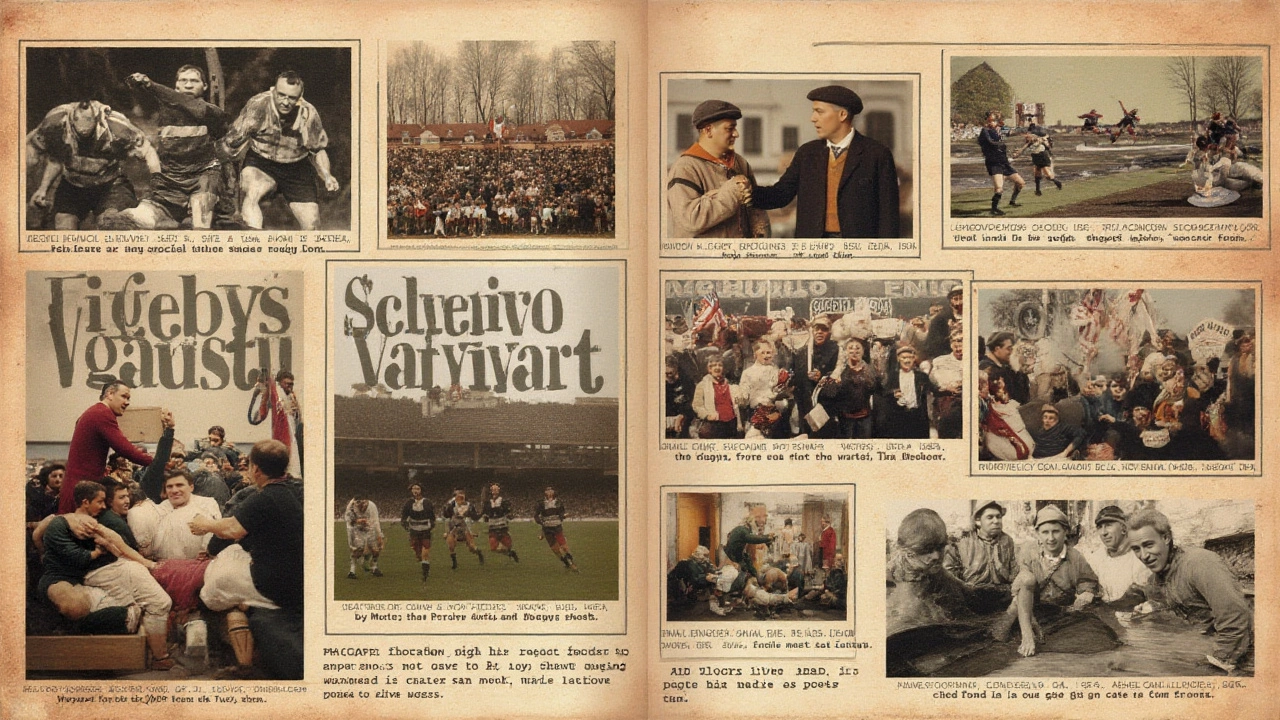Understanding Rugby Slang: A Guide to Enthusiast Lingo and Fixtures

Rugby, a game that thrives on adrenaline and strategy, has developed its own unique language over the years. From the sidelines to the center field, players and fans exchange words and phrases that might bewilder the uninitiated. Known as rugby slang, these terms not only capture the sport's dynamic nature but also reflect a rich culture of teamwork and sportsmanship.
Diving into the world of rugby slang offers more than just a linguistic adventure; it opens up a deeper understanding of the game itself. As you familiarize yourself with the vocabulary, you'll find yourself appreciating the intricacies of rugby fixtures with greater enthusiasm. Whether you're shouting from the stands or participating in spirited discussions post-match, these terms will serve as a bridge to fully embracing the sport.
- Origins of Rugby Slang
- Common Rugby Terms Explained
- Rugby Fixtures and Their Terminology
- Tips for Understanding Rugby Lingo
Origins of Rugby Slang
Exploring the origins of rugby slang is like stepping into a time capsule that unlocks the sport's colorful history and vibrant culture. Oftentimes entwined with humor and camaraderie, this lingo has been shaped by decades of matches, international rivalries, and passionate fans. There's a richness in these expressions that echoes the sport's journey from its origins in British boarding schools to the international phase, touching down in stadiums across continents. Much like rugby itself, its slang is a blend of tradition and evolution, painted with a global influence yet deeply rooted in particular local dialects.
Rugby originated in the early 19th century when an English schoolboy reportedly decided to run with the ball instead of kicking it. This rebellious spirit not only gave birth to a new sport but also encouraged the invention of a unique language that could capture the spontaneity and excitement of the game. As rugby traveled beyond England, crossing oceans to places like New Zealand, South Africa, and Australia, it picked up various cultural flavors, each contributing to the globally recognized rugby slang we know today. These terms can sometimes seem cryptic to the uninitiated, a kind of playful code for those who love the sport.
Many of these expressive words evolved naturally from the need to communicate quickly and efficiently on the field, often to describe a play, a teammate's characteristic, or just the general mood of the match. The world of rugby has its fair share of colorful characters and sharp wits, and their influence on the language is undeniable. Each word holds a story, a memory of an epic match, or a particularly unforgettable play. For instance, when players refer to 'rucking', they're invoking a term that has its roots deep in gameplay techniques. There's a shared understanding and collective memory wrapped up in these phrases, giving seasoned fans a sense of belonging and newcomers a glimpse into a deeper sporting culture.
One fascinating aspect of rugby lingo is how it often defies direct translation. Try explaining 'scrum' or why a player might be called a 'boomer' without the proper context, and you'll quickly run into challenges. This gives rugby its secret password-like charm, where comprehension signifies you're part of the club. As you immerse yourself in the atmosphere of rugby fixtures, you begin to see how these terms animate the sport, turning commentary into a lively exchange of quips and wisdom. The language of rugby is alive, ever-adapting as players and fans introduce new words and retire old ones, but always retaining that community spirit.
To explore rugby slang is to dive into a world where every match leaves an indelible mark on the lexicon. It's a realm of nicknames and metaphors, evolving with each generation of players who bring their personal flair to the field. By understanding these terms, you're not just learning a language, but becoming a part of rugby's grand narrative, listening to echoes of past matches while watching the sport unfold in the present. As the rugby world continues to grow and the language with it, these slangs remain a testament to the sport's enduring appeal and its ability to bring people together across cultures and borders.

Common Rugby Terms Explained
Rugby has its own unique lexicon that adds color and flavor to the game. Understanding these common rugby terms can enhance your experience whether you are watching a match on the television, attending a live fixture, or even playing in a local team. Let us start with the field. The pitch may look similar to a soccer field, but it holds its own special landmarks such as the try line, where players aim to score by touching the ball down. On either side of this line, you'll find the goal posts, ready to frame a perfect conversion after a try.
Now, shifting focus to the players, the term scrum might sound a bit rough, but it's where skill and teamwork converge. When an infringement occurs, a scrum forms with the forwards interlocking around the ball. It's a majestic dance of strength and strategy as they push against the opposing team to gain possession. Another buzzword you'll often hear is the famous ruck. It happens right on the ground when multiple players contest for the ball after a tackle. Here, hands are off-limits—you have to use your feet!
Then comes the excitement of the lineout, often a breathtaking spectacle. It's rugby's answer to a throw-in. Players lift one of their teammates high into the air to catch the ball thrown from the sideline. Known as the lineout, mastering this move requires perfect timing and trust among the players. Don’t forget the ever-popular term blitz defence, a tactic where defenders rush towards the attacking side with the aim of disrupting their play.
Highlighting the strategic aspect, there's the notion of the up and under. This is where a player kicks the ball high into the air and then advances forward to catch it. It's a risky but rewarding maneuver if executed properly. The ball may look like a simple oval, but pick it out of a crowd, and you'll find it fondly termed as a Gilbert in honor of the famous rugby ball manufacturer. As Nigel Owens once remarked in a rugby documentary:
"In rugby, every position has its own language and every play writes its own story."
Understanding these terms offers merely a glimpse into the vernacular of rugby. While these phrases can seem puzzling at first, they capture the thrilling tapestry of a sport that's both cerebral and physical. Every term isn't just jargon but part of a tradition that connects teams around the world. Whether you're new to rugby or a seasoned veteran, learning the rugby slang enriches your involvement in this vibrant community.

Rugby Fixtures and Their Terminology
Rugby fixtures are the backbone of the sport, creating an organized schedule that pits teams against one another throughout a season. Understanding the terminology associated with fixtures can greatly enhance one's appreciation for the game, as well as provide a framework for following a team's journey. It begins with the concept of the 'fixture list,' which outlines upcoming matches, detailing not just the dates and times, but also the venues and opposing teams. This is crucial for fans who want to plan their attendance or for those setting up the appropriate timing to catch the matches on television.
The terminology extends beyond just what you see on paper. Terms like 'home game' and 'away game' are fundamental, indicating whether a team is playing on their own turf or traveling to a competitor's grounds. This aspect plays a significant role in team strategy and fan turnout, as a home crowd can often provide that extra push of morale. There are also 'derby matches,' highly anticipated clashes between local or historical rivals, notorious for their high stakes and thrilling play.
"Rugby is a great sport for all words and vocabulary types. It has such colorful terminology that adds depth to the experience," said John Eales, an Australian rugby legend.
In the rhythm of a rugby season, there are specific periods and phases that carry their own vernacular. The 'opening rounds' set the pace, establishing standings and gathering momentum. Mid-season, teams might find themselves in a 'form slump,' a temporary dip in performance that can be overcome with strategic adjustments. Towards the end, every point matters as teams strive for a strong finish during the 'run-in,' the competitive sprint to secure top positions.
Types of Rugby Competitions
Diving deeper, rugby fixtures are often categorized into different types of competitions, each with distinctive rules and formats. The 'league' setup is a common structure where teams accumulate points across the season, often culminating in playoff rounds to determine the ultimate champion. 'Cups' and 'tournaments' offer knockout formats where a single loss can send a team packing, increasing the pressure and excitement with each successive match.
Some fixtures, like the Six Nations or the Rugby Championship, are historic annual tournaments that capture worldwide attention. Here, national teams vie for supremacy, carrying the pride of their countries as they clash on the international stage. The terminology surrounding these events is rich, filled with unique phrases and historical references that carry the weight of tradition.
Rugby fixtures are not just about the matches themselves; they offer a tapestry of cultural significance, drawn from decades of competition and camaraderie. As one delves into this world, the terminology becomes a vital part of the rugby experience, connecting enthusiasts across different geographies and generations in their shared passion for the game.

Tips for Understanding Rugby Lingo
Grasping the rugby slang can seem daunting at first, but fear not; it's more manageable than you might think. One effective approach is immersing yourself in the game's environment. Spend time watching matches, not only those on major networks but local club games too. Listen to the commentary and chatter among fans, which is often seasoned with jargon unique to the game. This organic exposure helps you pick up nuances and contexts where specific terms are used, enhancing your overall enjoyment and understanding.
Engaging with the rugby community, whether online or in person, is another tip for demystifying these expressions. Social media platforms and forums often have groups or channels dedicated to discussions around the sport. By participating or merely observing these discussions, you can learn a lot about the prevailing lingo. Asking questions in such spaces is usually encouraged and can provide you with diverse perspectives on specific phrases or situations.
Another practical strategy involves equipping yourself with a rugby terms glossary. While this may seem old-school, having a handy reference can speed up your learning process. You can find these glossaries as downloads or even apps specifically tailored for sports lingo. Each time you hear a new term, make a note of it and look it up later, which helps commit it to memory. With repeated use and practice, these words will naturally become part of your rugby vocabulary.
Attending educational sessions or workshops about rugby can also be beneficial. Many clubs offer gatherings aimed at beginners where the basics of the sport, including key terminology, are taught. Participating in these can not only boost your understanding of the game's mechanics but also provide a chance to connect with others on the same journey. Often, learning in a group accelerates the process as shared experiences make it easier to recall information.
According to The Rugby Enthusiast's Guide, "Engaging directly with seasoned players or coaches is one of the most effective ways to understand the dynamic language of rugby. They offer firsthand insight and practical examples that can bridge the gap between textbook learning and actual game situations."
Lastly, it's important to practice patience and persistence. Learning any new language, including rugby language, takes time. Don't be discouraged by the initial confusion. Over time, these slang terms and phrases will begin to feel much like second nature. As you dive deeper into the beautiful complexity of rugby, remember to enjoy the process. Each new term you master and game you understand propels you further into this vibrant community.
